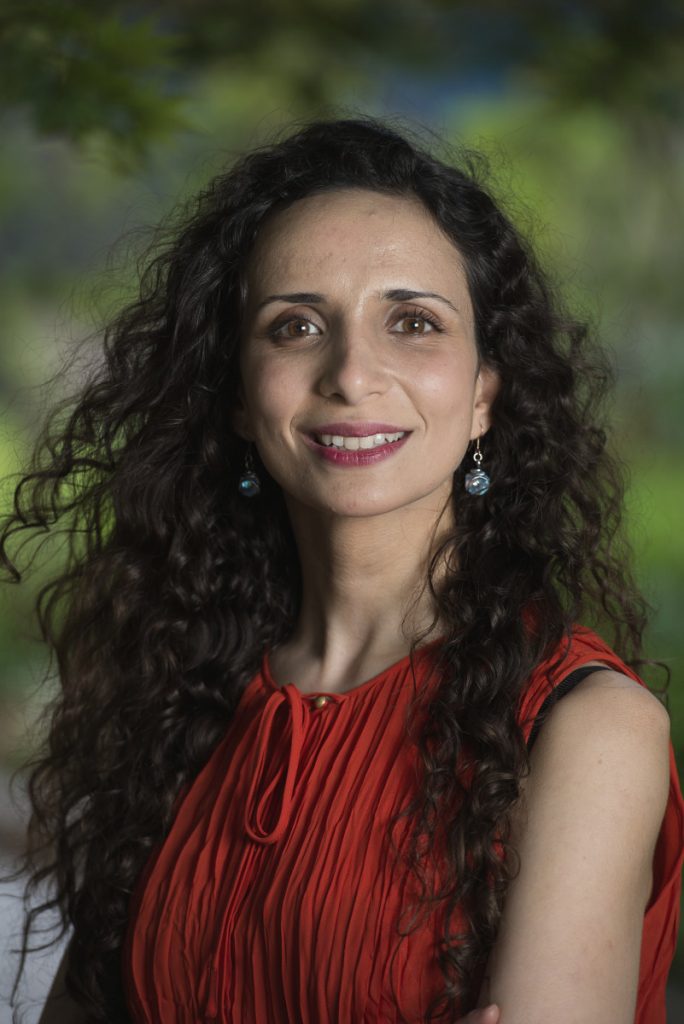
Gabriel Weber
Staff Writer
Evolutionary biologist, anthropology doctoral candidate and comedian Ella Al-Shamahi isn’t always sure what she thinks of homo sapiens as a whole. At 10:45 a.m. today in the Amphitheater, she’ll close out the Week Nine theme “Past Informs Present: How to Harness History” — and the 2025 Chautauqua Lecture Series — by discussing why homo sapiens’ domination became so all-encompassing, along with the nuances of what comes with that.
“I want to communicate our story and how remarkable it is that we started off as one of many, many, many human species — arguably the underdog — and now we’re the only species of human left,” Al-Shamahi said. “… We became an incredibly cooperative species, and that gave us this massive advantage; that cooperation is wonderful, but it is also tribalism which obviously can have its negative effects, as well. There’s this thing that’s hiding in plain sight called cooperation; it influences so much of our behavior and we don’t even know it.”
As evolutionary underdogs, humans have leveraged all of the advantages at our disposal. While our forward-thinking march hasn’t necessarily faltered for quite some time, the effects on the species we share space with is less than balanced.
“We are an incredibly complicated species. On the one side, our ancestors were incredibly brilliant; they were inventive, resilient, creative and cooperative. If they weren’t so magnificent, you and I wouldn’t be here. On the flip side, their success was so extreme that it seemed to be at the detriment of all of those around (them). It is just this very, very complicated dichotomy,” Al-Shamahi said. “It is brilliance, and it is also brilliance at a cost.”
Al-Shamahi became a paleoanthropologist in a roundabout way; when she applied to study evolutionary biology at Imperial College London, Al-Shamahi — at the time, a creationist missionary — was looking to disprove the theory. Due to her rigorous studies, Al-Shamahi finds that we are fundamentally a tribalist species who take on the opinions of our own tribe.
“That means that we will happily forgo nuance, if it doesn’t necessarily serve our purpose,” Al-Shamahi said. “On the flip side of that, if you’ve been through an experience like the experience I went through, which was effectively leaving my tribe because there wasn’t any nuance, it makes you incredibly desperate to encourage people to see the nuance. I think there are some things around us which encourage a lack of nuance — social media and the kind of the more partisan nature of news.”
With social media, the people closest to us geographically don’t necessarily have to be a part of our tribe, as would have been the case historically. Though this could denote freedom of choice, it’s led to a loneliness epidemic, Al-Shamahi said.
“We are capable of a lot when we cooperate; the problem comes when our cooperation is exceeded by tribalism. In this day and age, tribalism is particularly complicated. Previously, your tribe was the people who lived closest to you, and, even if you had to experience the negative sides of tribalism, the people close to you were keeping you alive. … If we could do one thing, for me, it would be to reduce tribalism, but encourage the people closest to us geographically to be our tribe.”
The history of human evolution, written by humans, skews toward the idea of humanity’s greatness. While our ancestors contended with life-threatening events every day, our lives have been consumed with comparatively trivial decisions that cement our apparent superiority over other species.
“In written memory, we have always been the most dominant form of life on Earth. I think when that happens, it’s really, really easy to portray us as the pinnacle of human evolution, to portray us as having always been destined for this as if it was written in the stars from the moment we were put onto the scene. Actually, that’s just not the case, but you don’t know that unless you really study human evolution,” Al-Shamahi said. “Twenty years of discovery within paleoanthropology made it difficult to deny the nature of our origin as being actually humble in origin; we didn’t erupt onto the scene.”
As part of Chautauqua’s 2025 Masters Series, at 5 p.m. today in the Hall of Christ Al-Shamahi will give an advance screening of her new PBS/BBC show “HUMAN.” The show traces the surprising story of human origins using fossil evidence, DNA sequencing and other cutting-edge scientific tools.
“I think people have been deeply moved by our story and also fascinated and shocked by it. For whatever reason, we just haven’t been telling our story right,” Al-Shamahi said. “I’ve never received a response to one of my shows like this before. It’s just incredibly different,”
Al-Shamahi believes audiences won’t have seen a show like it. She finds that telling the story of humanity beyond reducing humans to data points has influenced the response to the show — it’s seeing good ratings in the United Kingdom where it has already been released.
“When we tell science stories, we often take the emotion out of them, which to some extent is understandable,” she said. “But when it comes to human evolution, you can’t take the human out of human evolution — by definition, you need the human part.”




